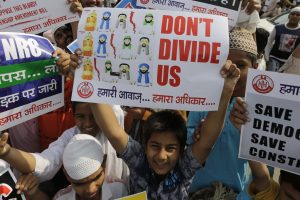The “Idea of India” — a beautiful experiment — is doomed to fail if nothing is done to stop the Citizenship Amendment Bill 2019 (CAB).
If ever in the post-independence history of India its secular character was under the threat of obliteration, it is now. The Citizenship Amendment Bill, the latest but not the last episode in the “politics of belonging” in India, has Muslims in its crosshairs. Any other explanation given by the ruling dispensation is malarkey.
Citizenship by definition is a political and sociological concept that encompasses what it means for individuals and groups to belong to or be a member of a political and/or a sociocultural community. It decides the civil, political, and social rights and duties of all those who are granted citizenship. At the second level, it help create the political and sociocultural identities of those who are considered citizens and is deeply connected to the politics of the feeling of belonging.
The CAB does not come as a surprise as the Bharatiya Janata Party (BJP), emboldened by support for its nationalistic policies, had put the bill in its manifesto. The BJP’s expressed intent for bringing the bill forward falls short, as is evident from the fact that religious refugees from just three countries in the neighborhood – Muslim-majority Pakistan, Bangladesh and Afghanistan – were chosen. Why are Myanmar, Sri Lanka, and China not on the list? Why are Hindu Tamils from Sri Lanka ineligible for citizenship under this ticking time-bomb of a bill? And why is the cut off 2014?
The CAB’s exclusion of Muslims from its list of potential beneficiaries is not inadvertent. The move spells Partition 2.0 for the Indian subcontinent. The Modi government has been eroding and attacking the social identity of Muslim community since 2014 and the CAB was brought in with an intent to impact the political identities of Muslims.
Stuart Hall and David Held have summed up citizenship as the “politics of belonging”:
From the ancient world to the present day, citizenship has entailed a discussion of, and a struggle over, the meaning and scope of membership of community in which one lives. Who belongs and what does belonging mean in practice (…) The issues around membership — who does and who does not belong — is where politics of citizenship begins. It is impossible to chart the history of the concept very far without coming sharply up against successive attempts to restrict citizenship to certain groups and to exclude others. In different historical periods different groups have led, and profited from, this “politics of closure”: property-owners, men, white people, the educated, those in particular occupations or with particular skills, adults.
The Bill redefines the very idea of India. In 1947, a theocratic state, Pakistan, was created on the basis of the ill-famed Two-Nation Theory while India came into existence as an independent state that refused to discriminate between its citizens on the basis of religion. India’s citizenship laws drew from two guiding principles – “jus soli” (place of birth) or “jus sanguinis” (right of blood). Differently stated, one could become an Indian citizen by being born in the country or by descent, i.e. if one’s parents were Indian nationals. This has been stated in the Article 5 of the constitution.
The detailed provisions of the constitution about citizenship (Article 5-11) before the CAB 2019 do not discriminate on the basis of religion, as the constitution makers envisioned India to be a secular republic. However, the CAB has introduced religion in defining the relationship of the nationals of this country with the state, thus paving way for India’s “theocratization.” And it is not a secret that the CAB is prelude to the BJP’s proposition of bringing in a National Register for Citizens (NRC) for India that is aimed at furthering hounding the Muslim community of the country. In effect, this will complete the vision of Mohammad Ali Jinnah’s Two-Nation Theory.
The resurging Hindutva vision of a homogenized country would not just stop at the Muslim community. Hence, the time of resistance is already here for the conscientious citizens of the country – liberals, seculars, Muslims, and atheists alike need to make it a common cause to resist the CAB.
The vociferous opposition to this bill needs to be heard across the country. Gandhi’s civil disobedience movement remains a potent weapon. For the masses to understand the implication of the bill, it is important that the dialogue between liberals-seculars and the masses continue. The ethos of Indian syncretic culture of Ganga-Jamuna tehzeeb are under threat. The Muslim community should not shut itself off; rather, this is the time to strengthen the bonds of intercommunity friendship.
And last but not least, the grand old Congress party needs rescuing. The Gandhi family needs to abdicate the proverbial throne and let other young leaders of Congress take up the mantle. The feeble leadership of the Gandhis is presently leading Congress toward its decimation and a weak opposition has proved detrimental to the health of Indian democracy.
Ritu Sharma has been a journalist in India for nearly a decade covering defense and security issues. She has worked with PTI, IANS and The New Indian Express. Ritu has a Master’s in conflict studies from Germany. Her academic interests include religious nationalism, ethnic conflict, and Islamophobia.

































